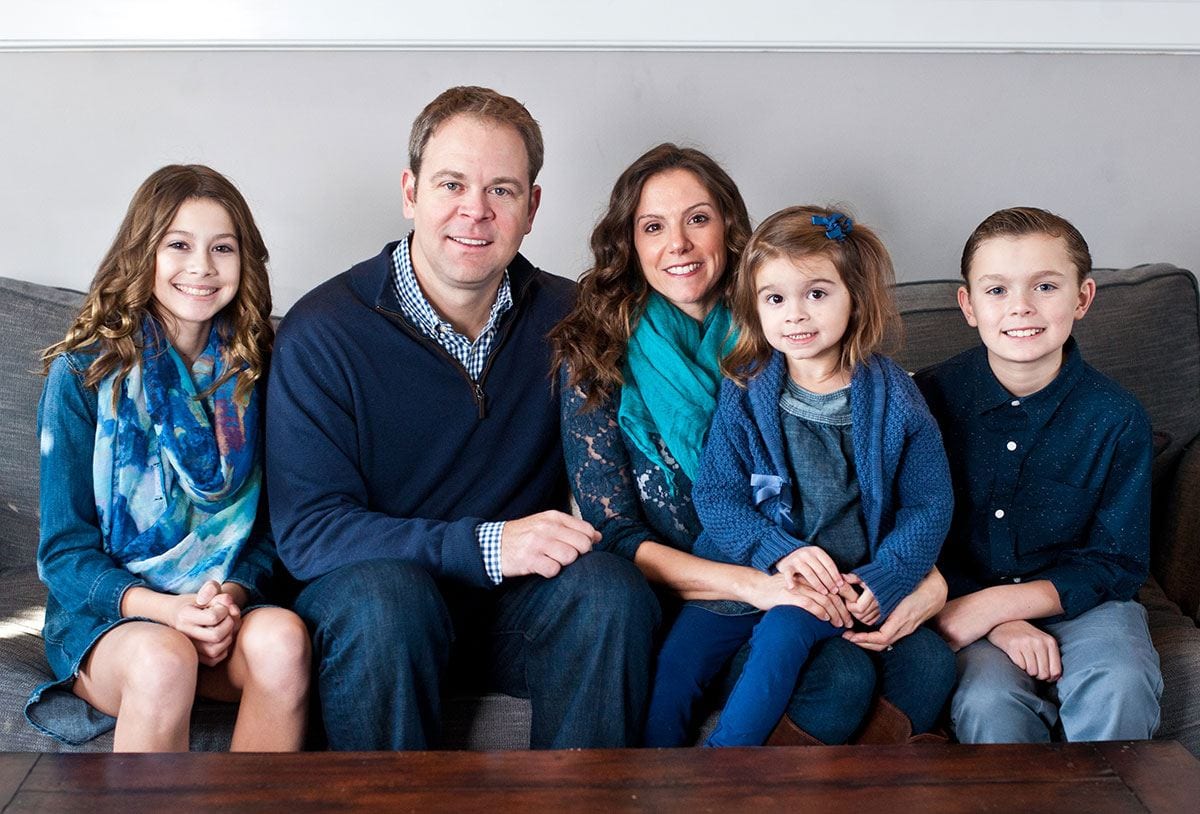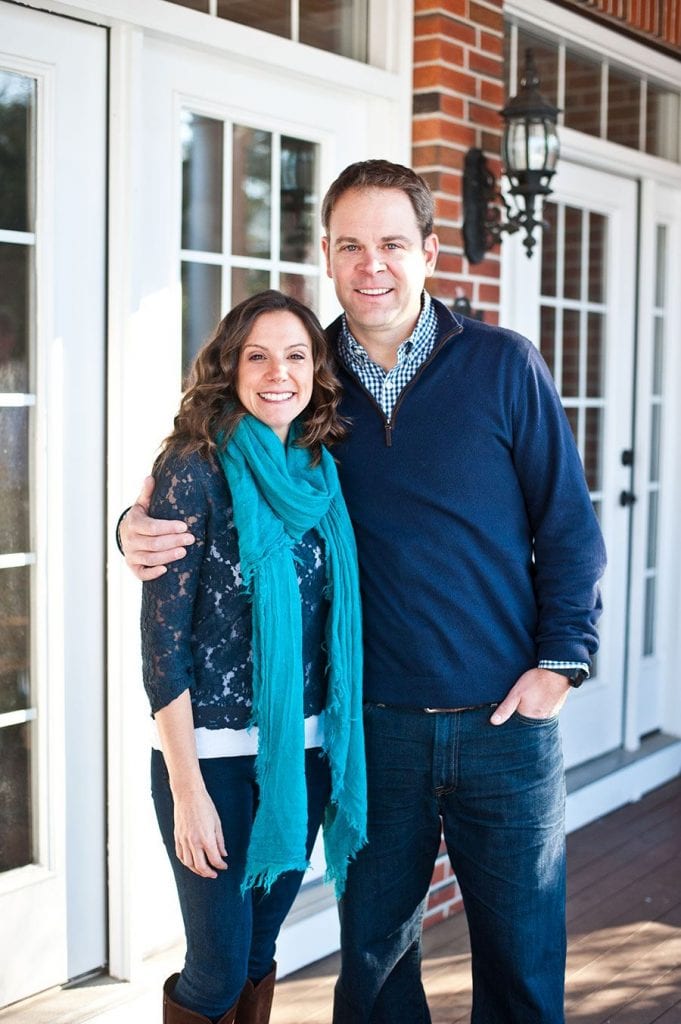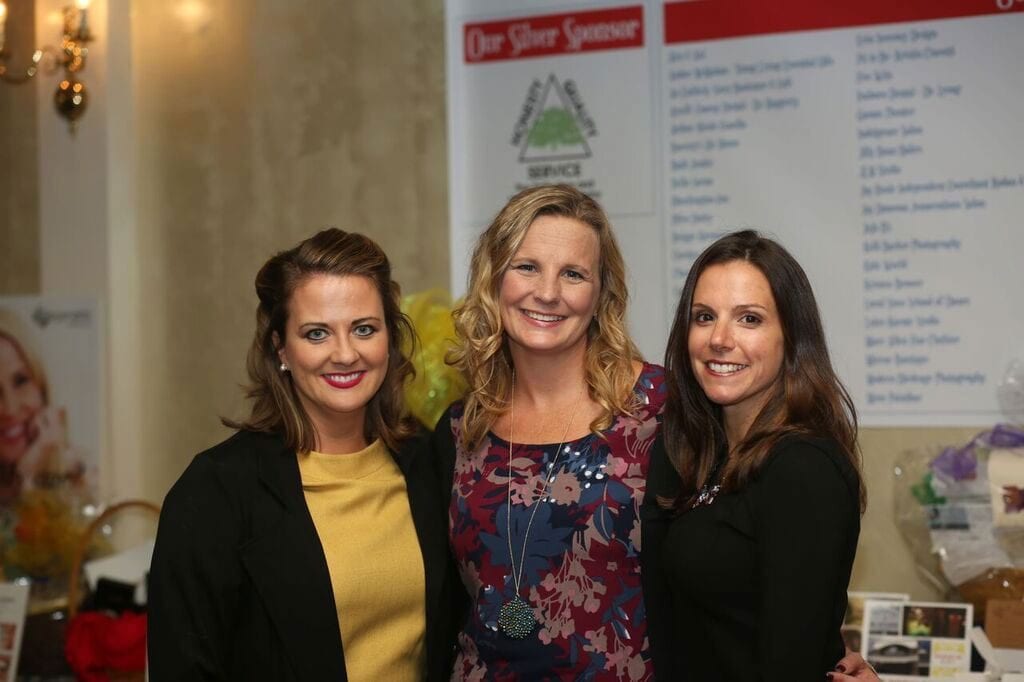June 19, 2018
From adversity to advocacy: Kane family determined to make a difference

By Courtney Coelho
Before her third child was born, Caitlan Brower Kane ’99 & ’01G had never heard of peripartum cardiomyopathy.
She certainly couldn’t have told you that it’s a rare, potentially fatal heart condition that typically occurs late in pregnancy or after giving birth. Or, that it’s difficult to diagnose because its symptoms mimic those of other more common illnesses like pneumonia and even the discomfort of late-term pregnancy.
“That’s one of the biggest problems with this disease: It goes undiagnosed until it’s too late for many women,” said Caitlan.
But today, nearly six years after her daughter, Madelyn, was born, Caitlan, along with her husband, Mark Kane ’99, can talk at length about peripartum cardiomyopathy, its symptoms, and current research being done on this condition that affects between 1,000 and 3,000 women in the U.S. each year. That’s because Caitlan was one of the fortunate patients to live through PPCM. If it wasn’t for a chance encounter with her primary care physician, along with her own intuition, she may not have survived.
Now, Caitlan and Mark have dedicated themselves to spreading the word about this life-threatening condition. The two, who met at Providence College their first year and were married in 2000, see it as their mission after making it through such a harrowing ordeal.
“Surviving this, my calling is helping other women and raising awareness,” said Caitlan.

The couple’s work takes myriad forms. Caitlan has spoken about her experience at several events, including last summer when she gave an emotional speech at Rising Up, a series of TED-style talks about survival. She serves on both the national board of the Peripartum Cardiomyopathy Association and the heart and vascular advisory board at Brigham & Women’s Hospital.
Mark, a former Friar hockey player who had heart surgery in college to treat a rare disorder, does his part as a member of the Boston board of the American Heart Association.
But perhaps dearest to them is Sisters @ Heart (sistersatheart.org), the nonprofit Caitlan co-founded two years ago with two other women dedicated to improving the lives of local families who are affected by heart disease and stroke. Though in its early stages, the organization has raised funds for research projects at Boston Children’s Hospital and Brigham & Women’s, and it provides support to patients and their families, offering everything from home-delivered meals to a photographer for a family with a young child in the hospital.
“There are a lot of national organizations that harness the power of how big they are, but we felt that the missing piece was the localized level, those immediate financial, emotional, and physical needs because we’ve all lived through it,” Caitlan explained.
Caitlan and Mark’s work even brought the North Attleboro, Mass., couple back to PC to meet with a hockey player with atrial fibrillation who collapsed during a game, Garrett Gamez ’19 (Chino Hills, Calif.).
“We are trying to help him figure out what’s next because he’s been told he’ll never play hockey again,” said Mark. “It’s another way for us to stay involved with our mission.”
PC was where the couple learned the importance of helping others, said Caitlan, who majored in elementary/special education and later earned a master’s degree in literacy at PC. Not only was it woven into the curriculum, but it was part of their college experience. Both of them were involved with the Feinstein Institute for Public Service, and Caitlan recalls working regularly with Providence schoolchildren during both her undergraduate and graduate education programs.
“At PC, we were always taught to find a way to give back. No matter if it’s big or small, anyone can make a difference. That really stuck with us,” said Caitlan.
Post-delivery warning signs
None of this work would have come about had it not been for Caitlan’s harrowing experience. At the time of her daughter’s birth, there was no reason to believe Caitlan was at risk for PPCM, a form of heart failure. She was a healthy, active 34-year-old mother who had no issues while pregnant with daughter Annalise, now 13, or son Finn, now 11, aside from a slightly early arrival with her first.
But shortly after giving birth in July 2012, she wasn’t feeling well.
“When the nurse came in to check my vitals I told her I felt like my heart was missing whole beats. She said she would mention it to the doctor. She also told me that my blood pressure was going up,” recalled Caitlan.
Despite the concerns of Caitlan and the nurse, the obstetrician came in the next morning and told her she was clear to go home. When she voiced worry about her heart to another doctor, she was told that it was probably just her milk coming in, coupled with anxiety about the new baby.

But back home that night, she knew something wasn’t right.
“I woke up covered in sweat, and I couldn’t breathe. I felt like I was having an asthma attack despite not having asthma,” she said.
She went to the hospital, where she was diagnosed with severe pneumonia, pumped with steroids, and sent home once more.
The next night was more of the same, so she had Mark drop her off at the ER. By chance, Dr. Chris Sanders, her primary physician, who is also a cardiologist, was working and came in to check on her. After hearing Caitlan’s symptoms, he decided to run an echocardiogram. It was a live-saving decision.
“He came back into the room and said, ‘Where’s Mark? You’re in heart failure, and I need him here because we have some decisions to make.’ I was in shock,” Caitlan said.
“I still get emotional thinking about that phone call,” Mark confessed.
Tests revealed that Caitlan’s heart was only functioning at 15 percent and was three times its normal size. It likely would have stopped altogether within a few hours had she not gotten help.
That first night, doctors took six liters of fluid off of Caitlan’s body. She spent a week in the ICU — isolated from her children and limited to a few visitors — before heading home with 12 medications, including shots Mark had to give her in her stomach daily, and strict limitations on her physical activity. She was told she couldn’t breastfeed her newborn and couldn’t have any more children.
Recovery was slow, but after two years Caitlan was down to two medications and becoming much more active. It was then that she started connecting with PPCM survivors on Facebook and sharing her story. Her advocacy and fundraising work grew from there.
In addition to the more obvious ways they give to their cause, the Kanes said there have been some other, less expected positives to come out of their situation.
Mark, a finance major at PC and a senior vice president at CIBC Private Wealth Management in Boston, said he’s better at his job now, as he’s able to relate to, and have more direct and empathetic conversations with, clients who are going through their own health crisis.
“You quickly realize that, stating the obvious, there is nothing more important than good health,” said Mark. “Your second realization is that time is more important than money … and I wanted more time with Caitlan.”

The two also use their story to educate their three children. They take them to fundraising events when appropriate and make a point of taking an annual bucket-list family vacation to teach them to cherish time together and live life to the fullest. Last year, the Kanes went diving with whale sharks in Mexico, and this year they’re headed to Patagonia.
“Going through something like this changes your perspective. We are more focused on the here and now and how we can make today great and meaningful,” said Caitlan.
Caitlan will be on an adrenaline blocker for the rest of her life. The medication makes her feel lethargic, but it’s necessary given the permanent damage PPCM likely did to her heart. Now educated on the illness, Caitlan realizes there were symptoms she was exhibiting that should have tipped doctors off earlier: a persistent cough, heart palpitations, difficulty breathing when lying down, fluid retention, and elevated blood pressure.
She now knows that a simple echocardiogram would have revealed her heart was going into failure days earlier. If she hadn’t made the decision to go back to the hospital twice, the outcome could have been far graver.
“I was trying to self-advocate, but I wasn’t doing a good enough job. I think people are thinking more about the baby and the baby’s health. It’s important to listen to your body, and if the doctors are pushing you off, push back,” said Caitlan.
Now, with a new lease on life, Caitlan wants to make sure others won’t have to push as hard as she did for an accurate — and life-saving — diagnosis.
“Surviving this, my calling is helping other women and raising awareness,” she said. “When you survive something, you always ask yourself why, then you sort through it, and it brings a different meaning to your life.”





